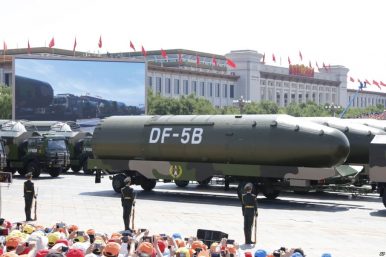By Raymond Wang
 The Trump administration’s Nuclear Posture Review (NPR) was a break from its predecessors in many ways. It envisions an expanded role of nuclear weapons in U.S. military doctrine, the development of low-yield weapons — specifically a low-yield SLBM — and the removal of 2010 NPR language that called for maintaining strategic stability with China. Unsurprisingly, it has elicited vociferous responses from Chinese state media, government officials and netizens alike. There have already been sound analyses on the issue of low-yield SLBMs and the Trump administration’s justifications for it from both American and Russian perspectives.
The Trump administration’s Nuclear Posture Review (NPR) was a break from its predecessors in many ways. It envisions an expanded role of nuclear weapons in U.S. military doctrine, the development of low-yield weapons — specifically a low-yield SLBM — and the removal of 2010 NPR language that called for maintaining strategic stability with China. Unsurprisingly, it has elicited vociferous responses from Chinese state media, government officials and netizens alike. There have already been sound analyses on the issue of low-yield SLBMs and the Trump administration’s justifications for it from both American and Russian perspectives.
From the Chinese perspective, I contend that the NPR has tried, and failed, to strike a balance between signaling to China that the low-yield option is primarily directed against a Russian “escalate to de-escalate” doctrine on one hand, while attributing “limited use” intentions to China in order to justify developing “graduated response options” on the other. Indeed, the accusation that Beijing might “mistakenly conclude that it could secure an advantage through the limited use of its theater nuclear capabilities or that any use of nuclear weapons, however limited, is acceptable” cannot be justified based on published Chinese doctrinal documents such as the 2013 Science of Military Strategy, nor statements of Chinese officials. On a technical level, China does not possess, and will probably require nuclear tests to develop, low-yield warheads.
In a nutshell, the new NPR conflates a theater-use scenario, for which China is capable of through missiles such as the dual-capable DF-26, with a low-yield, “limited use” scenario. There is nothing in either China’s declared posture, nor its deployed capability, that suggests the Chinese government would interpret a Chinese use of theater nuclear weapons — be it a strike on Guam or on a U.S. aircraft carrier in the Western Pacific — as anything other than the start of a total nuclear conflict, one in which gaining a warfighting advantage is meaningless.
However, the 2018 NPR does pose an interesting question: now that the U.S. has changed its declared strategy, how will China respond? More specifically, will the 2018 NPR create a self-fulfilling prophecy, in which PLA hardliners would use it as an opportunity to advocate for China to develop its own low-yield capability?
A recent episode between various Chinese state media outlets suggests that those who want to maintain China’s assured retaliation posture and reject developing a low-yield capability had the final word this time round.
Hard-line reactions were already floated in response to the leaked draft of the NPR – a Global Times editorial on 9 January suggested that the proposed U.S. modernization program would “render China’s ‘minimal reprisal’ strategy insufficient”. While harsh, such language is not entirely uncharacteristic of the Global Times, which has hawkish tendencies.
After the official release of the NPR, the Global Times ran two articles on February 5, both suggesting that China should “seriously consider developing low-yield capabilities.” One of the articles attributed this suggestion to an “anonymous military expert,” while the other was an editorial. Furthermore, the editor-in-chief of the Global Times published a widely-shared video on Weibo commenting on the NPR, in which he made a similar recommendation. As such, it seems that this position was largely pushed by the Global Times editorial staff in the immediate wake of the NPR’s release.
However, the pushback against this position was swift and forceful. Just two days later on February 7, Xinhua ran an article by Lu Yin, an Assistant Professor at National Defense University, which reaffirmed China’s assured retaliation posture, and rejected China adopting the logic of “making nuclear weapons more usable.”
Even more explicitly, an article published on February 14 in the China Youth Post — a state publication that is not known for being moderate — directly criticized one of the Global Times editorials. The author is Cui Maodong(崔茂东), who is a researcher at the Strategic Research Centre at the Chinese Academy of Engineering. Citing the editorial, the author argued that China should “unequivocally” reject developing a low-yield capability, and reaffirmed China’s current posture. He even talks mockingly about the “anonymous military expert,” and claims that “the logic of a nuclear warfighting strategy … does not have a leg to stand on.”
Ultimately, the Global Times itself ran an article on February 14 by Li Sheng, an “international relations observer,” that “explained” the NPR. In the article, he argued that China has the ability to “comfortably” respond to U.S. modernization, and reaffirmed China’s existing posture, cautioning against “entering into an arms race.”
It is hard to determine whether this was a coordinated effort by the establishment at pushing back against the more radical views of the Global Times editorial board. However, the institutional background of the moderate authors and the swift response suggests that the hard-liners remain a minority. Furthermore, the fact that the Global Times itself eventually published a more moderate article suggests that the moderates had the final word on this issue — at least for now.
Raymond Wang (@soraywang ) is a Graduate Research Assistant at the James Martin Centre for Nonproliferation Studies, and an MA candidate at the Middlebury Institute of International Studies at Monterey.
No comments:
Post a Comment